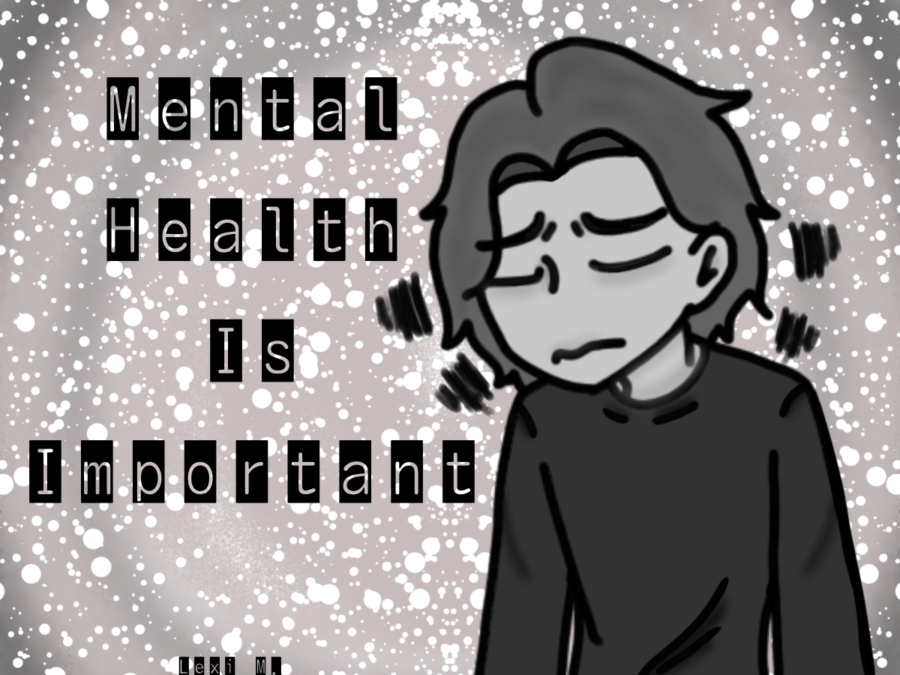Let’s talk about mental health
Mental Health Awareness month a reminder of mental health importance
May is Mental Health Awareness Month, which makes this month a great opportunity to focus on how mental health affects everyone, how people can appreciate the importance of mental health and take mental illness seriously. Isolation from society during quarantine and throughout the struggles of COVID-19 took a major toll on mental health across the world. Mental health affects how we think, act and feel on a day to day basis, making it a very important issue. Mental health is also the most stigmatized health issue that people face in the world, and the only way to destigmatize it is to talk about it.
People were stuck at home for months on end during quarantine, which right off the bat takes a major toll on mental health. A Centers of Disease Control and Prevention (CDC) report that surveyed adults across the U.S. in June 2020 said that 31% of respondents reported symptoms of anxiety or depression, 13% reported having started or increased substance use, 26% reported stress-related symptoms and 11% reported having serious thoughts of suicide in the past 30 days. This isn’t a small issue; it is an issue that spans across the world, involving all ages, and it was significantly prevalent in the last two years. The majority of teens’ mental health was negatively affected while in quarantine because of social isolation. Adolescents (13-19) are going through their identity developmental stage and during this time they need peers to help them find their place in the world.
Teens showed signs of mental disorders throughout quarantine, and many struggled with developing disorders. While being online for school, students not only missed out on social interactions, but the isolation in their homes and the struggles that came with the online school continued to take a toll on their mental health. A study conducted in June said that 75% of college students reported feeling more anxious or stressed due to online learning. Online school increases stress and anxiety, and many students struggle to keep up with classes, assignments and sometimes even showing up to school. Some teachers not understanding the seriousness of a student’s mental health disorders, or not knowing, increased misunderstandings that come with mental health. It is a serious problem, and it isn’t something that a person can just “snap out” of. A lot of mental health struggles go unseen, and those who struggle are most likely too afraid to speak up because reactions seem to be negative.
Society putting a stigma on mental health causes those struggling to feel shamefulness and disapproval. This causes it to be so much harder to speak up. Seeing symptoms of a disorder can also be harder to find than some people think, but paying close attention is always a must. Knowing what to look for when it comes to a particular disorder can come about by looking into symptoms of the disorder, or looking for the five basic signs of a possible disorder.
These five basic signs are “long-lasting sadness or irritability, extremely high and low moods, excessive fear, worry, or anxiety, social withdrawal and dramatic changes in eating or sleeping habits,” New Roads Behavioral Health said.
Taking into consideration what a person may think about the possibility of them having a disorder is also a need because they are the ones experiencing the distress, and their thoughts should be taken into account. Seeing therapists and psychologists should be encouraged instead of shunned. Mental health is an aspect of everyday life; it affects all of us constantly. Mental health is extremely important and should be one of the number one priorities for a person. Being able to have an outlet for emotions and painful events in everyday life is a great basic coping mechanism.
Everyone is worthy of help, and everyone deserves a chance to get help. No one’s problem is less worthy than another, and everyone deserves a chance to work through what they are struggling with. Seeking help is the first step in recovery, but even before that one has to realize that they have a problem and are struggling, which can be hard and takes a lot of strength. Practicing healthy coping mechanisms such as getting enough sleep, exercising, drinking water, meditation, a creative outlet and so much more, are ways to practice healthy mental health. Now is the time for the world to realize the importance of mental health, and for everyone to do their part in making this a safe and encouraging atmosphere for everyone who struggles with mental illness. If you or someone you know is struggling with a mental health crisis please refer to the PA Support & Referral Helpline: 1-855-284-2494.



